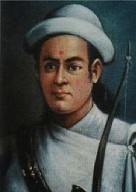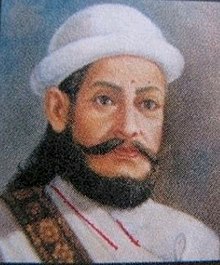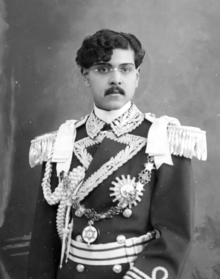Portal:Nepal/Featured biography
| This Wikipedia page has been superseded by Portal:Nepal and is retained primarily for historical reference. |
| Note: Article entries are now being transcluded directly on the main portal page. However, this page should be retained for historical reference. |
Featured biography 1
Portal:Nepal/Featured biography/1
Gyanendra Bir Bikram Shah Dev (born 7 July 1947) is the former and last reigning King of Nepal, reigning from 2001 to 2008, when the monarchy was ended. As a child, he was briefly king from 1950 to 1951, when his grandfather, Tribhuvan, took political exile in India with the rest of his family. His second reign, which began after the 2001 Nepalese royal massacre, was marked by constitutional turmoil.
His brother King Birendra had established a constitutional monarchy in which he delegated policy to a representative government. The growing insurgency of the Nepalese Civil War during Gyanendra's reign interfered with the elections of representatives. After several delays in elections, Gyanendra suspended the constitution and assumed direct authority in February 2005, asserting that it would be a temporary measure to suppress the Maoist insurgency after civil governments had failed to do so. In the face of broad opposition, he restored the previous parliament in April 2006. He was deposed two years later by the first session of the Constituent Assembly, which declared the nation to be the Federal Democratic Republic of Nepal and abolished the 240-year-old Shah dynasty. (Full article...)
Featured biography 2
Portal:Nepal/Featured biography/2
Bidya Devi Bhandari (Nepali: विद्यादेवी भण्डारी, pronounced [bid̚djadebi bʱʌɳɖaɾi]; born 19 June 1961) is a Nepali former politician who served as the second president of Nepal from 2015 to 2023. She formerly served as the minister of defence and minister of environment and population.
She is the first woman to hold the presidential office in the country. She served as the vice-chairperson of the Communist Party of Nepal (Unified Marxist–Leninist) and was the chair of the All Nepal Women's Association before being elected president. Bhandari previously served as the Minister of Defence, the first woman to hold the office, from 2009 to 2011. She also served as the Minister of Environment and Population in 1997, and has been an active campaigner for environmental awareness and women's rights in Nepal. In June 2017, she visited the headquarters of the International Union for Conservation of Nature in Gland, Switzerland and met with the director general Inger Andersen to discuss enhanced collaboration on nature conservation and sustainable development. In 2016, Forbes placed her at number 52 on its list of the world's 100 most powerful women. She was dropped off the list in 2017. (Full article...)
Featured biography 3
Portal:Nepal/Featured biography/3
Khadga Prasad Sharma Oli (Nepali: खड्ग प्रसाद शर्मा ओली; born 22 February 1952), commonly known as K. P. Sharma Oli or simply K. P. Oli (English pronunciation: , pronounced [ˈkʰʌɽɡʌprʌsad̪ ˈoli]), is a Nepalese politician who is serving as the prime minister of Nepal since 15 July 2024.
Chairman of the Communist Party of Nepal (Unified Marxist–Leninist) since 2014, he previously served as prime minister on two consecutive occasions, from October 2015 to August 2016 and from February 2018 to July 2021. He has been the Member of Parliament for Jhapa 5 since 2017. He previously served as an MP for Jhapa 6, Jhapa 2, and Jhapa 7. (Full article...)
Featured biography 4
Featured biography 5
Featured biography 6
Featured biography 7
Featured biography 8
Featured biography 9
Portal:Nepal/Featured biography/9
Balbhadra Kunwar Chhetri (30 January 1789 – 13 March 1823) was a Gorkhali military General, Commander and administrator in the Sikh Empire and the Kingdom of Nepal. He is one of the National heroes of Nepal. He was highly praised for his military skill for the defence of Nalapani fort in the Anglo-Nepalese War (1814–1816). He was a captain in the Nepalese military and was tasked as commander to protect the forts of Dehradun. (Full article...)
Featured biography 10
Portal:Nepal/Featured biography/10
Bhrikuti Devi (Sanskrit: भृकुटी), known to Tibetans as Bal-mo-bza' Khri-btsun, Bhelsa Tritsun ("Besa" Nepal lit. 'Nepali consort') or simply Khri bTsun (lit. 'royal lady'), was a princess of the Licchavi kingdom in Nepal. In c.622 Bhrikuti became the first wife and queen of the king of Tibet, Songtsen Gampo (c.605–650 CE). Bhrikuti was seen as an incarnation of Green Tara, and is credited for bringing Buddhism to Tibet, together with the Jowo Mikyo Dorje statue for which the Jokhang Temple in Lhasa was built. (Full article...)
Featured biography 11
Portal:Nepal/Featured biography/11
Prithvi Narayan Shah (Nepali: श्री ५ बडामहाराजाधिराज पृथ्वीनारायण शाह देव, romanized: Shri Panch Badamaharajadhiraj Prithvi Narayan Shah Dev; 7 January 1723 – 11 January 1775), was the last king of the Gorkha Kingdom and first king of the Kingdom of Nepal (also called the Kingdom of Gorkha). Prithvi Narayan Shah started the unification of Nepal. He is also credited for moving the royal seat of power to Kathmandu. (Full article...)
Featured biography 12
Portal:Nepal/Featured biography/12
Amar Singh Thapa distinguished as Badakaji Amar Singh Thapa(Nepali: बडाकाजी अमर सिंह थापा), or Amar Singh Thapa The Elder, (also spelled Ambar Simha) also known by the honorific name Bada Kaji ("Senior Kaji") or Budha Kaji ("The Old Kaji"), was a Gorkhali military general, governor and warlord in the Kingdom of Nepal. He was the overall commander of the Nepal Army in the conquest of Western Provinces and authoritative ruler of Kumaon, Garhwal in the Kingdom of Nepal. He was referred by the King of Nepal to have been deployed as Mukhtiyar (equivalent to Prime Minister) of Western Provinces of Kumaon, Garhwal. He is often hailed as Living Tiger of Nepal (Nepali: ज्यूँदो बाघ; jyūm̐do bāgha) and was posthumously regarded as one of the national heroes of Nepal, who led the Anglo-Nepalese War for the Gorkhali Army. Amarsingh Chowk Pokhara and Shree Amarsingh Model Higher Secondary School are named after Amar Singh Thapa. (Full article...)
Featured biography 13
Portal:Nepal/Featured biography/13
Tribhuvan Bir Bikram Shah Dev (Nepali: श्री ५ महाराजाधिराज त्रिभुवन वीर विक्रम शाह देव), (30 June 1906 – 13 March 1955) was King of Nepal. Born in Kathmandu, the capital city of Nepal, he ascended to the throne at the age of five, upon the death of his father, Prithvi Bir Bikram Shah, and was crowned on 20 February 1913 at the Nasal Chowk, Hanuman Dhoka Palace in Kathmandu, with his mother acting as regent. At the time of his crowning, the position of monarch was largely ceremonial, with the real governing power residing with the Rana family. (Full article...)








